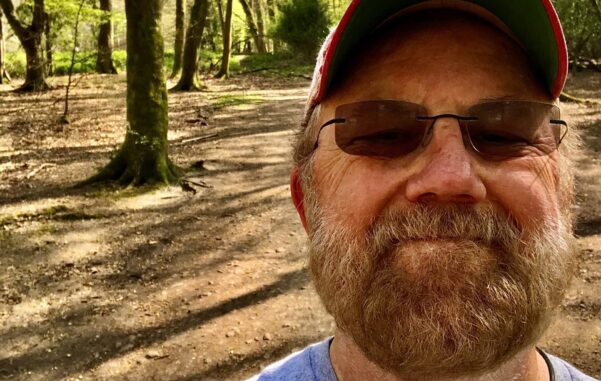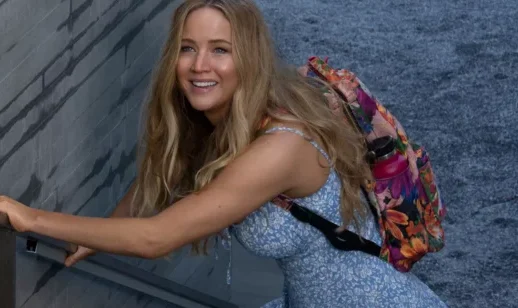By Patrick Z. McGavin
Through his collaborations with Judd Apatow, Adam McKay and Paul Feig, Brent White, ACE, is a go-to picture editor for bringing the funny in films.
“I’m an easy mark,” White joked in a recent interview. Maybe so, but his resume speaks volumes, including as it does McKay’s “Anchorman: The Legend of Ron Burgundy” and Apatow’s “The 40 Year-Old Virgin.”
His newest project, director Gene Stupnitsky’s “No Hard Feelings,” is an R-rated, risqué comedy about an older woman (Jennifer Lawrence) hired to sexually initiate a 19-year old introvert (Adam Barth Feldman).
Here are some highlights of the conversation (mild spoilers follow):
CineMontage: What is the most significant challenge in capturing the right tone in cutting comedy?
Brent White: I prefer things that are based in reality. A thing that is more real to you, if you feel like you are connected to the person, what happens with something that is funny has more impact.
I think I try to bring a certain natural quality, or reality, to the comedy. Even the stuff that is really crazy and out in left field, like “Anchorman” (2004), there is this ideal of those guys having real backstories, real lives, real relationships, and that makes the comedy and the jokes that much more funnier. You relate to them, you see yourself in them, or you see someone you know in them. I think that is the thing that attaches you to comedies in a good way, rather than just, “That was a funny joke.”
CineMontage: Are you a practitioner of Charlie Chaplin’s famous observation that life is a tragedy seen in close-up, but a comedy in long shot?
Brent White: That’s not always the case. Sometimes you’re in tight, and you can actually see what’s going on. Some of my best stuff are the moments when people are awkward. I think you see some of that awkwardness in a tighter shot. The actors who really dig down are really kind of amazing.
That was one of the beautiful things about working with Jennifer Lawrence. She’s a movie star. She can just really dial it in. The scene where she listens to the young man play the piano. It’s a single shot, just a long crazy long push in it, and she is so electric and amazing in that shot, it really makes that scene work.
CineMontage: The premise of “No Hard Feelings,” is very suggestive, given the present political and sexual climate. How did you and the director, Gene Stupnitsky, address the elephant in the room?
Brent White: The thing is that we don’t make these kinds of comedies anymore. This is the first one in a really long time. When we were making “The 40-Year-Old Virgin,” that was taboo. I had a young family at the time, and when people asked what I was working on, I didn’t even tell them the full title. I just said, “The 40-Year Old.”

Brent White, picture editor. PHOTO: Courtesy Brent White.
The thing about “No Hard Feelings” is that it truly is this real relationship movie. The more you understand the young kid and Jennifer’s character, the more real and interesting the comedy becomes. It really works once you’re on the same page with those guys.
CineMontage: What was your process with the seduction scene at the animal shelter, which is a great example of balancing verbal, visual and physical humor?
Brent White: There are different things you have to do. You have to address the story beats. “This is what the character wants, and this is how she has decided to go about getting it.” Even though Jennifer’s character is so focused on what she is trying to accomplish, she has no idea who this individual is she is dealing with. Part of the comedy is her figuring that out.
She has this way of how she interacts with people, and it’s not the healthiest way to deal with relationships. She is really pushing that. On the other side of the coin, Percy just wants a real relationship. He is more interested in interaction with people and friendship. They’re playing in two different games. What’s funny about the scene is Percy is naive, and doesn’t see that she is gaming him in a really manipulative way. That contradiction is what makes it play.
CineMontage: Most of the previous losing my virginity films are told almost exclusively from the male point of view. Your film upends those gender stereotypes.
Brent White: The reasoning behind the story is just different, and that is one of the things that drew me to the script when I read it.
I’ve been really fortunate working with Paul Feig. A lot of his films are female-driven and female-based. It has been really great to work in that vernacular, as opposed to the male idea of what that is. There is this reverse gender point of view. Basically Jennifer acts like a guy, but it is different in a really good and positive way.
CineMontage: Another crucial scene is the skinny dipping sequence. How complicated was getting that tone just right?
Brent White: I think it’s the scene when you talk about the movie five or 10 years from now, this is the thing that we’ll be talking about because it’s really brazen. Jennifer’s very courageous in going for it, showing how she runs her life, and how she feels about the world around her.
Technically the scene was shot in three different parts. We shot sections of it on a real beach. We shot it in a sandbox with blue screens in a tank. There are all of these elements that were shot over time so that when they all came together, make it all one piece. They all happened on different days, with people in different attitudes and moods. The challenge was making you feel like it all happened at the same time.
That’s one of the great things about editing. You can take these things that were all shot in disparate areas, different places—this was shot the first week, this was shot the last week, and get them all together with the visual effects work, and make them work. That is the really interesting nuts and bolts of putting movies together.
CineMontage: What was the creative dynamic like between you and Gene Stupnitsky?
Brent White: Basically what I do is cut right behind them. After they shoot for about a week, I start to assemble it. When they finish shooting, I have a couple of weeks to get the movie into one piece. It’s called the editor’s cut, but it is not even that.
I work on a scene, and I just put it away, and then I work on another scene. When I work on a couple of scenes that are connected, I put them together and see how they play as a sequence. I put everything into reels, and see how it plays in a long-form situation. And then you look at how the whole movie plays, and that becomes how you go from scene to scene, and you are trying to get those to work as best as they can. You want to look at the joints, and make sure they don’t bump.
That is what I’m doing until Gene shows up for his 10-week director’s cut. I’m getting my hands dirty, and seeing where all the bodies are buried. This is the best performance, so I have to work this scene around the dailies. It’s really tough to look at those first assemblies because they’re really long. There are things the director has in their head I wasn’t privy to. I put the first assembly together, and I’m beholden to it. Sometimes I get it right, and sometimes I’m way off base. It’s the next version where I sit with the director, and go through everything and get everything they have in their head and the things they like when they were shooting it into the movie. At that point I start to really like the movie.
CineMontage: A lot of comedies are frenetic and fast. There are almost no reaction shots, or sharp cuts. The cutting seems much more observational.
Brent White: Sometimes that rhythms are just dictated by the material. I’ve got to go somewhere, and this doesn’t sustain itself in the shot, or the joke isn’t sustained from the first to second and third joke.
What’s interesting about this movie is from the get-go, when we were talking about it, we said we wanted this to be funny in a Mike Nichols way. It’s Montauk, Long Island, New York, and that was the reference point for us. What I loved about it was that it is a real New York movie. It feels like a real place, and I think that’s one of the strong points. By shooting it in real environments, it has a real sense of place.
CineMontage: You cut five episodes of the cult show, “Freaks and Geeks.”
Brent White: I came into the business through the Sundance Institute. I was a video editor for their summer workshops.
I saw the [“Freaks”] pilot, and I said that’s a show I really want to work on. I knew those people. I knew that time period. Those people were real, and you felt for them, the hijinks and stuff that happens to them, you understand who they are. It was a show ahead of its time, and that’s why it only lasted one season. Judd and Paul said, “We only have one shot at this. It’s not going to last. Let’s make 18 hour-long, independent movies. Let’s put it all in, and make it work.”
That’s why the show has such a lasting effect. It was destined not to return. Everybody put everything they could into it. When I work with Paul, we always reference the work we did on “Freaks and Geeks.” The awkward material when I work with Judd, it’s based on the emotions we felt when we were doing the show.
CineMontage: Was becoming an editor fateful, self-ordained, or some combination?
Brent White: I was at Sundance one summer working in a workshop. It’s basically a camp, and you go live in these cabins in these beautiful mountains right near where I grew up in Utah. You spend a lot of time watching movies, and working on new filmmakers’ scripts.
One night, my friend Hugh Ross said I have a tape for a pilot my buddy Jake Kaden just made, and we should go back to the cottage and watch it. It was brilliant, so much fun. I said, I’d love to work on that. Hugh called Jake Kasden, and he put my name in the hat.
They already had three editors. They were completely staffed. One of the editors quit to do a movie. My name was bandied about at the time, so it was fate. Things line up in a way you don’t know. Those relationships from “Freaks and Geeks” have made my career.
Judd Apatow produced “Anchorman,” and Adam McKay didn’t have an editor. Judd said, “Just get this guy Brent White. We can probably get him cheap.”
Patrick Z. McGavin is a Chicago-based cultural journalist. He maintains the film site, Shadows and Dreams (www.patrickzmcgavin.substack.com.)


